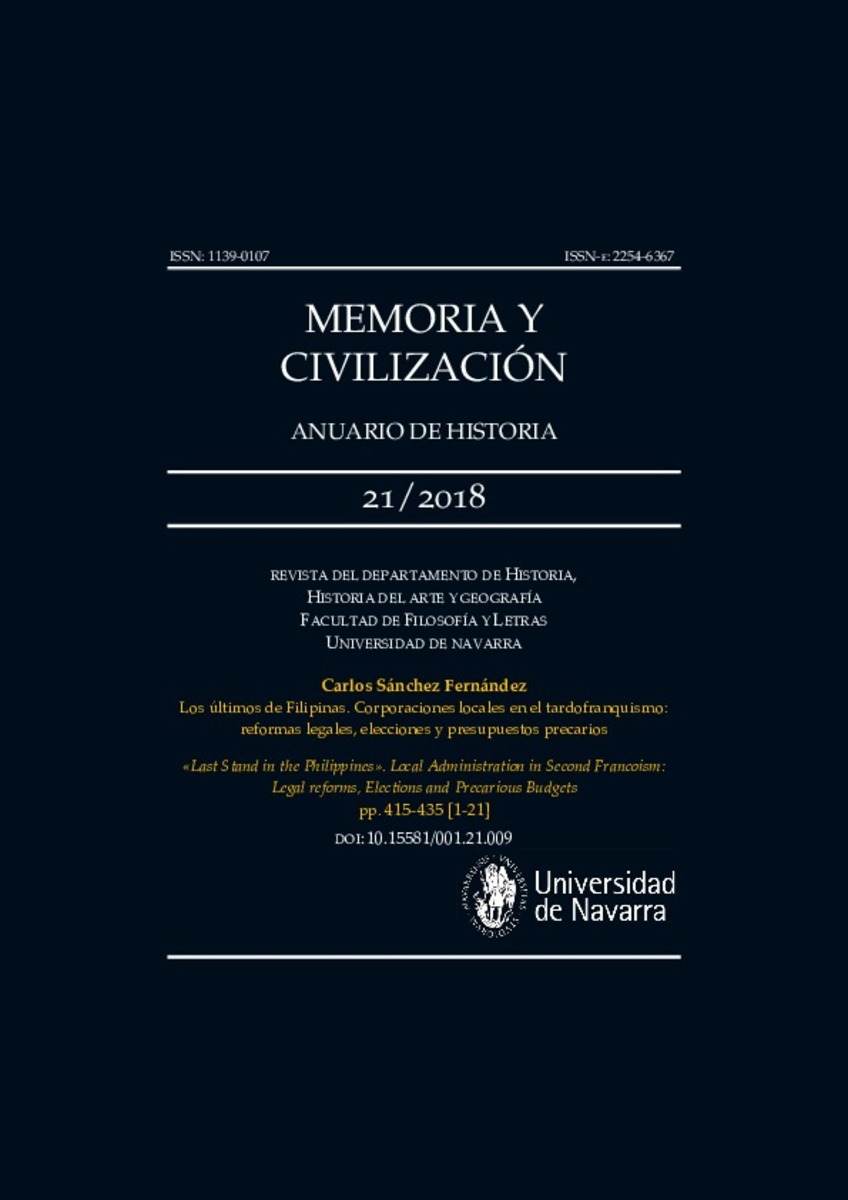Full metadata record
| DC Field | Value | Language |
|---|---|---|
| dc.creator | Sánchez-Fernández, C. (Carlos) | - |
| dc.date.accessioned | 2019-01-09T10:48:41Z | - |
| dc.date.available | 2019-01-09T10:48:41Z | - |
| dc.date.issued | 2018 | - |
| dc.identifier.citation | Sánchez-Fernández, C. (Carlos). "«Los últimos de Filipinas». Corporaciones locales en el tardofranquismo: reformas legales, elecciones y presupuestos precarios". Memoria y Civilización. 21, 2018, 415 - 435 | es |
| dc.identifier.issn | 2254-6367 | - |
| dc.identifier.uri | https://hdl.handle.net/10171/56083 | - |
| dc.description.abstract | La esfera municipal estuvo supeditada en España al poder estatal central desde el siglo XIX, desde un punto de vista legal, financiero y de gestión. Esto se acentuó durante el franquismo. Sin embargo, desde los años 1960 se debatió en el seno de la dictadura la reforma de los ayuntamientos, como parte de un proyecto más amplio de institucionalización y legitimación. Los debates en torno a la reforma se dilataron en el seno del régimen y finalmente ésta no tuvo frutos relevantes. La nueva ley de 1975 y las elecciones de 1976 lo atestiguan. Tampoco se introdujeron cambios apreciables en la financiación municipal. Quedó claro que la reforma de las corporaciones locales representaba un verdadero nudo gordiano. Durante el proceso de cambio político la vida municipal se vio postergada, demorándose su renovación democrática hasta la primavera de 1979. La prioridad serían las autonomías y no los ayuntamientos. | - |
| dc.description.abstract | Municipal government was under close scrutiny by the State in Spain since the nineteenth century, legally, financially and administratively. During Francoism scrutiny increased. Nevertheless, the reform of municipal life was debated within the regime since the 1960s, as part of a broader project of institutionalization and legitimization. The debate on reform was prolongued, yet for the most part fruitless. The new law of 1975 and the elections of 1976 are telling of the negligible results of Francoist reform. Municipal income remained insufficient. It became clear that reform of local administration was truly a Gordian knot. Municipal life was not a priority during the process of political change, its democratic renewal was delayed until the Spring of 1979. The priority were the autonomías and not the ayuntamientos. | - |
| dc.language.iso | spa | - |
| dc.publisher | Servicio de Publicaciones de la Universidad de Navarra | - |
| dc.rights | info:eu-repo/semantics/openAccess | - |
| dc.subject | Administración municipal | - |
| dc.subject | Franquismo | - |
| dc.subject | Transición | - |
| dc.subject | Elecciones | - |
| dc.subject | Presupuestos | - |
| dc.subject | Municipal Administration | - |
| dc.subject | Francoism | - |
| dc.subject | Transition | - |
| dc.subject | Elections | - |
| dc.subject | Budgets | - |
| dc.title | «Los últimos de Filipinas». Corporaciones locales en el tardofranquismo: reformas legales, elecciones y presupuestos precarios | - |
| dc.title.alternative | «Last Stand in the Philippines». Local Administration in Second Francoism: Legal reforms, Elections and Precarious Budgets | - |
| dc.type | info:eu-repo/semantics/article | - |
| dc.identifier.doi | 10.15581/001.21.009 | - |
| dadun.citation.endingPage | 435 | - |
| dadun.citation.publicationName | Memoria y Civilización | - |
| dadun.citation.startingPage | 415 | - |
| dadun.citation.volume | 21 | - |
| dc.date.updated | 2019-01-09T10:48:41Z | - |
| dc.description.version | Peer Reviewed | - |
Statistics and impact
Items in Dadun are protected by copyright, with all rights reserved, unless otherwise indicated.






